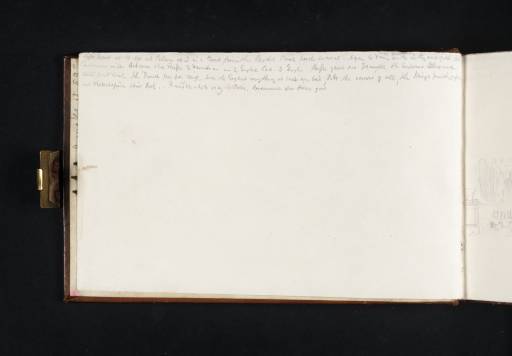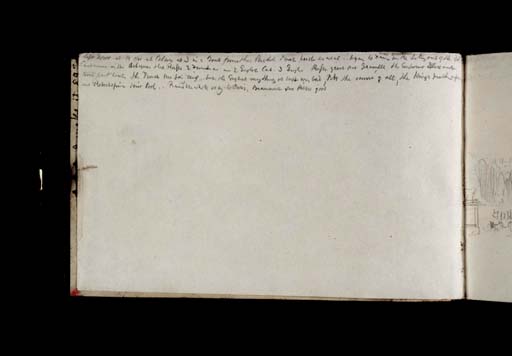Joseph Mallord William Turner Notes by Turner Concerning the Start of his Journey in France 1819
Image 1 of 2
Joseph Mallord William Turner,
Notes by Turner Concerning the Start of his Journey in France
1819
Joseph Mallord William Turner 1775–1851
Folio 1 Verso:
Notes by Turner Concerning the Start of his Journey in France 1819
D13992
Turner Bequest CLXXIII 1 a
Turner Bequest CLXXIII 1 a
Pencil on white wove paper, 114 x 185 mm
Inscribed by the artist in pencil (see main text)
Accepted by the nation as part of the Turner Bequest 1856
References
1909
A.J. Finberg, A Complete Inventory of the Drawings of the Turner Bequest, London 1909, vol.I, p.503, as ‘“Left Dover at 10. Arr. at Calais at 3 in a Boat from the Packet Boat. Beset as usual. Began to rain next morn. on the setting out of the Dil. Conversation in the diligence. the Russe 2 Frenchmen and 2 English Cab. 3 Engl. Russe great par example the Emperor Alexander tooit part tout the French tres bon gens but the English everything at last was bad, Pitt the cause of all, the King’s death and fall, and Robespierre their tool. Rained the whole way to Paris. Beaumont sur Siene (?) good”’.
1930
A.J. Finberg, In Venice with Turner, London 1930, pp.14–15.
1979
Andrew Wilton, J.M.W. Turner: His Life and Work, Fribourg 1979, pp.138, 151 note 12.
1981
Maurice Guillaud, Nicholas Alfrey, Andrew Wilton and others, Turner en France: aquarelles, peintures, dessins, gravures, carnets de croquis / Turner in France: Watercolours, Paintings, Drawings, Engravings, Sketchbooks, exhibition catalogue, Centre Culturel du Marais, Paris 1981, p.105, reproduced fig.167, as ‘Notes’.
1982
Andrew Wilton, Turner Abroad: France; Italy; Germany; Switzerland, London 1982, p.12.
1983
John Gage, Jerrold Ziff, Nicholas Alfrey and others, J.M.W. Turner, à l’occasion du cinquantième anniversaire du British Council, exhibition catalogue, Galeries nationales du Grand Palais, Paris 1983, p.36 note 11.
1987
John Gage, J.M.W. Turner: ‘A Wonderful Range of Mind’, New Haven and London 1987, p.66.
1984
Cecilia Powell, ‘Turner on Classic Ground: His Visits to Central and Southern Italy and Related Paintings and Drawings’, unpublished Ph.D thesis, Courtauld Institute of Art, University of London 1984, pp.74 note 23, 459 note 23.
1987
Cecilia Powell, Turner in the South: Rome, Naples, Florence, New Haven and London 1987, pp.21, 201 note 13.
1997
James Hamilton, Turner: A Life, London 1997, pp.196, 325 note 8.
1999
Ian Warrell, Turner on the Seine, exhibition catalogue, Tate Gallery, London 1999, pp.18, 252 note 20.
2001
Cecilia Powell, ‘Travel’, in Evelyn Joll, Martin Butlin and Luke Herrmann (eds.), The Oxford Companion to J.M.W. Turner, Oxford 2001, p.341.
2008
James Hamilton, Nicola Moorby, Christopher Baker and others, Turner e l’Italia, exhibition catalogue, Palazzo dei Diamanti, Ferrara 2008, pp.41, 89 note 4.
2009
James Hamilton, Nicola Moorby, Christopher Baker and others, Turner & Italy, exhibition catalogue, National Galleries of Scotland, Edinburgh 2009, pp.39, 150 note 4.
The four-line inscription on this page comprises notes concerning the start of Turner’s 1819 journey to Italy through France. The writing resembles a diary entry and represents a rare, albeit very short, first-hand account of the artist’s travels. First transcribed by Finberg and repeated here with only minor variations,1 the text reads as follows:
Left Dover at 10 arr at Calais at 3 in a Boat from the Packet Boat beset as usual. began to rain ^next morn^ on the seting out of the Dil. | Conversation in the Diligence the Russe, 2 Frenchmen and 2 English Cab. 3 Engl. Russe great par example the Emperor Alexander | toout part tout the French tres bon gens but the English everything at last was bad, Pitt the cause of all, the King’s death and fall | and Robespierre their tool. Rained the whole way to Paris, Beaumont sur Oise good
It is believed that Turner set out from London on 31 July 1819 and therefore it is likely that he left Dover on either Sunday 1, or Monday 2 August.2 As the entry records he crossed the Channel on the packet boat and the reference to being ‘beset as usual’, probably recalls his experience in 1802 when he was ‘nearly swampt’ arriving at Calais Pier (see the Calais Pier sketchbook, Tate D04960; Turner Bequest LXXXI 58). The voyage should have taken three to three and a half hours but instead seems to have lasted for five hours suggesting inclement weather.3 At Calais he transferred to a diligence, a large public stagecoach where the luggage was kept covered by canvas on the roof (for a sketch see folio 32 verso, D14041). The diligence took him to Paris, and either because of the aforementioned rain, or because he was already familiar with this part of the journey from earlier European tours, he made virtually no sketches of the passing landscape during this part of the itinerary. The only exception is a view of the cathedral at Beauvais, fifty miles to the north of Paris, see folio 1 (D13991), although he remarks here that ‘Beaumont sur Oise’ (a town approximately twenty miles north of the capital) was ‘good’.
In the French diligence there were four places for travellers to sit: the coupé, or front compartment of the interior, generally believed to be the most desirable location; the berline, or middle part of the interior; the rotonde, or back of the interior, the least recommended placing, described by one guidebook as a ‘receptacle of dust, dirt and bad company’; and finally, the banquette or imperial, which was outside at the front of the carriage above the coupé.4 Turner’s reference to the ‘Cab[riolet]. 3 Engl[ish]’ probably means that there were three of his fellow countrymen sitting in the banquette, which since it was often covered like a cabriolet meant that it could be quite a pleasant place from which to savour the journey. In addition, he seems to have shared the vehicle with two further Englishmen, a Russian and two Frenchmen, and it is notes on the conversation and opinions of this mixed company which form the largest part of the inscription. One contemporary guidebook noted that to travel in a diligence was a wonderful experience encompassing: ‘life, and motion, and joy. The moment you enter, you are on terms of the most perfect familiarity with the whole set of your travelling companions. In an instant, every tongue is at work, and every individual bent upon making themselves happy for the moment, and contributing to the happiness of their fellow-travellers.’5 The passage adopts a curious mixture of French and English suggesting that he was listening to the conversation in French and had enough knowledge of the language to follow the gist of the discussion and to record snippets which interested him.6 The main subject at hand appears to have been the French Revolution, still a contentious topic despite the events having occurred twenty to thirty years earlier.7 According to Turner, the Russian believed that the ‘Emperor Alexander’ (I of Russia) was a great man, that the French were all ‘tres bons gens’ (very good fellows), but that the ‘bad’ English were the cause of all the troubles in France, including the overthrow of the monarchy and the execution of King Louis XVI. He cited the main offender as the English Prime Minister William ‘Pitt’ the Younger (1759–1806), who had made the Revolutionary leader, Maximilien ‘Robespierre’ (1758–1794) his ‘tool’.8
The fact that Turner felt inspired to try and write about his experiences indicates how important and exciting this first trip to Italy was for him. However, after these brief lines the text is abandoned, never to be taken up again. It seems as though the artist wished to record his thoughts and impressions at a greater speed than he could form them in words and so he reverted to the medium with which he was most comfortable, that of sketching. Indeed, one observer during the artist’s lifetime noted that Turner sketched with a fluency that was more akin to writing than drawing.9
Nicola Moorby
February 2013
How to cite
Nicola Moorby, ‘Notes by Turner Concerning the Start of his Journey in France 1819 by Joseph Mallord William Turner’, catalogue entry, February 2013, in David Blayney Brown (ed.), J.M.W. Turner: Sketchbooks, Drawings and Watercolours, Tate Research Publication, August 2013, https://www


